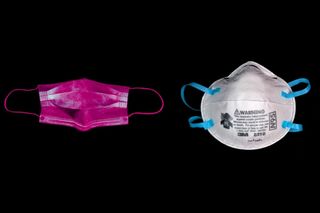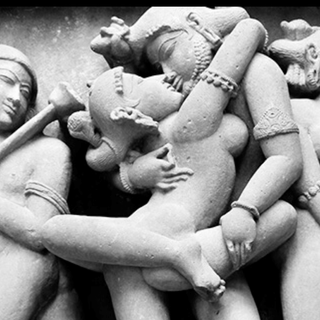
Debunking the Myths About Covid19
Avoiding non-veg food will not keep the novel coronavirus at bay.

The global panic that has ensued in the face of a brand-new, poorly understood, fast-spreading virus has allowed misinformation and myths to thrive. This creates an endless, self-perpetuating cycle of fear — and does little to actually stop the spread of disease. By contrast, accurate information enables us to protect ourselves effectively and limit the spread of Covid19. Below, we use coronavirus facts to debunk some of the most common myths circulating around the internet, social media, and word of mouth.
Myth: Indian immune systems are so exposed to germs, they’re strong enough to protect against Covid19.
Exposure to pathogens can provide some immune benefits – but not against the novel coronavirus. Evidence overwhelmingly suggests ongoing exposure to coronavirus doesn’t build immunity, but erodes it; health workers at the frontlines of the pandemic are contracting Covid19 at much faster rates than their age-group peers precisely because their immune systems have been worn down by overexposure to the virus.
Myth: Herd immunity will protect people from Covid19.
Herd immunity is a phenomenon that occurs when so many members of a community have immunity against a pathogen that it diminishes to the point that even non-immune people are protected. Unfortunately, there’s no evidence that catching and surviving the novel coronavirus leaves patients with immunity to it; in fact, many experts expect the virus to evolve, much like the flu virus does, so that even people who have had Covid19 may still be vulnerable to repeat infection in the future.
Myth: Superfoods like garlic and turmeric can protect people from Covid19.
Garlic, turmeric, and other foods are known for their antibacterial properties – but because Covid19 is caused by a virus, not bacteria, their use is inapplicable. Additionally, there is no scientific consensus that any food can boost immunity to the point of defending against an unknown pathogen like the novel coronavirus.
Related on The Swaddle:
The Latest on Coronavirus Cases in India
Myth: If the people around you aren’t coughing or feverish, you’re safe.
Experts now believe that many cases of Covid19, especially among young people, display no symptoms – but are still contagious. This is one of the main reasons behind the rapid and insidious spread of the disease: many people are carrying it but don’t even realize that they are contagious.
Myth: Vegetarian diets can protect against Covid19.
Covid19 may have originated in an open-air meat market, but eating non-vegetarian food does not transmit the disease, or put one at a greater risk of getting infected. The virus spreads via contact with an infected person — inhaling droplets when they cough or sneeze or touching a surface where these droplets may have landed and then touching one’s own mouth or nose. Proper handwashing, not touching our faces, and social distancing can offer protection against contracting the infection.
Myth: India’s warm climate will stop the spread of Covid19.
Until last week, experts believed that the novel coronavirus would not thrive in warmer climates. But with the number of cases increasing each day, experts actually are not sure about how the virus behaves in different climates. “The impact of the virus is as serious in hot-humid weather conditions of Singapore as in the colder environment of European countries,” Dr. Randeep Guleria, the director of AIIMS, Delhi, told the Economic Times.
Myth: Gargling salt water can prevent catching Covid19.
Gargling a saline solution offers no protection against Covid19, nor is it an effective treatment. Gargling a warm solution can ease throat pain, which is likely how this myth originated, but it can’t kill a virus, nor prevent infection. Proper handwashing, not touching our faces, and social distancing are the best preventative measures we can take.
Related on The Swaddle:
Self‑Medicating With Chloroquine to Treat or Prevent Covid19 Can Be Fatal
Myth: Blood type determines who contracts Covid19.
People with any blood type can contract Covid19. One very small study suggests people with Type A blood might be more vulnerable to the coronavirus, but that doesn’t mean all other blood types are safe, nor all people with Type A doomed.
Myth: Antibiotics can treat Covid19.
Antibiotics treat diseases caused by bacteria; they are completely ineffective against Covid19, which is caused by a virus. Taking unnecessary antibiotics to ‘treat’ Covid19 can have disastrous effects. First, it contributes to the spread of antibiotic-resistant bacteria. Second, it uses up antibiotics that Covid19 patients with secondary infections might need to survive. If you have Covid19 or suspect you have it, consult a doctor by phone.
Myth: If you can comfortably hold your breath for 10 seconds, you don’t have Covid19.
Covid19 is often asymptomatic. While it’s a respiratory infection that can make breathing difficult, Covid19 often manifests without symptoms, meaning you could be infected and have no problems holding your breath. If you have Covid19 or suspect you have it, consult a doctor by phone.
Myth: If you have a runny nose and/or a wet cough, it’s just a cold.
In a minority of cases, coronavirus can weaken the immune system to the point of allowing secondary respiratory infections, like pneumonia, to take hold. While Covid19 is characterized by a dry cough, these secondary infections can cause wet, or phlegmy coughs. If you have Covid19 or suspect you have it, consult a doctor by phone.
Related on The Swaddle:
ICMR Recommends Pooling Test Samples for Covid19 in Low‑Infection Areas
Myth: The new coronavirus is mutating to become deadlier.
The novel coronavirus behind Covid19 does not mutate significantly as it spreads, say researchers who are studying its genetic material. While all viruses evolve over time, there is no evidence any emerging strains of the new virus are becoming more dangerous; the integrity of its genome is relatively unchanging, reports the Washington Post. This is good news for the development of a vaccine that can remain effective long term.
Myth: Homeopathy can prevent, treat, and cure Covid19.
Homeopathy is not effective in preventing, treating or curing coronavirus infection. Systematic reviews of research have repeatedly found zero high-quality studies that speak to the philosophy’s effectiveness in treating illnesses. Homeopathy does not ward off or kill viruses. What can protect and treat us? Following expert recommendations around social distancing and handwashing, and quality allopathic care should we become sick.
Myth: A new outbreak, this time of hantavirus, has started in China and is spreading.
Hantaviruses are not new, nor can they be transmitted between humans. This myth has its roots in the recent death of a hantavirus-infected man in China. Unlike the novel coronavirus, which before the pandemic was not seen in humans, virologists have known about hantaviruses for decades. Also unlike the novel coronavirus, which spreads rapidly and easily from human to human, hantaviruses can only be ‘caught’ from contact with rodent urine, feces, saliva, or bites. Cases of hantavirus infection, while serious, are extremely rare and don’t spread between humans.
Myth: Spraying disinfectant on someone who could have Covid19 will stop the spread of coronavirus
While alcohol and chlorine can disinfect surfaces, spraying them all over someone’s body will do nothing to kill any viruses that have already entered and multiplied within someone’s system. In fact, the WHO has warned that spraying such substances can be harmful to mucous membranes, such as the eyes and mouth.
Related on The Swaddle:
What Is Serological Testing and Why Is It Important?
Myth: Inhaling steam will kill the coronavirus and prevent Covid19.
Inhaling steam may help sooth one symptom of the virus — a sore throat — but it will not prevent an infection or cure an existing one. The moment steam enters the mouth, it immediately cools, and by the time it gets to the throat, it is far too cool to kill a pathogen. In fact, any steam hot enough to kill a virus could lead to burn injuries, Dr. Jason McKnight, Assistant Clinical Professor in the Department of Primary Care and Population Health at Texas A&M University, told AFP. There’s also the risk of injury from potential contact with the hot water and the hot container.
Myth: Coronavirus dies instantly upon coming in contact with copper.
This misconception stems from a study that found the coronavirus can survive for up to four hours on copper surfaces. That timeframe is much lower than the survival rate of the virus on plastic and stainless steel, where it can survive for up to three days, but the claim that the virus dies immediately upon coming in contact with copper is false.
Myth: Pneumonia vaccines or flu shots can prevent Covid19.
Flu shots are designed to prevent infections with influenza viruses, which are very different from coronaviruses. As for pneumonia vaccines, the WHO has clarified that they do not provide protection against this strain of coronavirus, which is so new and different that it needs its own vaccine.
Myth: Taking a hot bath will kill the coronavirus and prevent Covid19.
There is no evidence to suggest that taking a hot bath kills the coronavirus, or prevents one from being infected with Covid19. The WHO has clarified that our normal body temperature remains around 36.5°C to 37°C, regardless of the temperature of water we bathe in. Taking an extremely hot bath can, in fact, cause us burns.
Related on The Swaddle:
Blood Transfusions from Recovered Coronavirus Patients May Provide Effective Treatment, Doctors Say
Myth: Drinking hot water will kill the coronavirus and prevent Covid19.
Coronavirus cannot be killed by drinking hot water. First, there is no scientific evidence to suggest that drinking warm water will prevent Covid19. Second, while having warm drinks can soothe a sore-throat, drinking or eating hot things will not significantly reduce your chances of picking up coronavirus, or slow it down once you have caught it, Dr. Ranj Singh, an N.H.S. Consultant Pediatric Emergency Physician and TV presenter in the U.K., wrote for Al Jazeera. Heat can inactivate coronaviruses insofar as heating medical equipments at high temperatures to decontaminate or sterilise them, for instance. However, this does not work in humans — extremely hot water can, in fact, cause nasty burn injuries.
Myth: Using a blow dryer to shoot hot air into the nose can kill the coronavirus.
Hot air from a blow dryer can’t reach into cells where viruses sit and cause damage, Dr. Adam Berman, an ER doctor at Long Island Jewish Medical Center, told The New York Post. In fact, medical professionals are worried about adverse effects of employing this tactic. “False! Please don’t. Our nose carries bacteria, as part of normal flora.Those bacteria may get confused,” tweeted Faheem Younus, who specializes in infectious diseases at the University of Maryland, Associated Press reported. Not to mention: putting a very hot blow dryer near your face is a burn accident waiting to happen.
Myth: Coronavirus can be transmitted through mosquito bites.
Coronavirus cannot be spread through mosquito bites. The WHO clarified that there is no information nor evidence to suggest that the new coronavirus could be transmitted by mosquitoes. It is a respiratory virus which mostly spreads through droplets expelled into the air when an infected person coughs or sneezes, or through droplets of saliva, or discharge from the nose, the WHO added.
Myth: Applying mustard oil in the nostrils kills the coronavirus before it can enter the respiratory system.
Applying mustard oil in the nostrils does not kill the coronavirus and prevent Covid19. While mustard does contain some antiviral compounds — which is likely where this myth originated — it is by no means an effective antiviral that kills this particular virus.
Myth: Keeping chopped onions in the room purifies the air and kills the coronavirus.
Onions do not absorb bacteria or viruses when left in a room, and do nothing to reduce the risk of infections, according to Dr. Wong Jyh Eiin, Nutritional sciences senior lecturer and Council Member of the Nutrition Society of Malaysia. Further, consuming onion that has been exposed to room temperature for more than two hours, can cause food-borne diseases due to contamination.
Related


PMS‑ing May Be a Sexist Stereotype, but It’s Also a Real Thing
